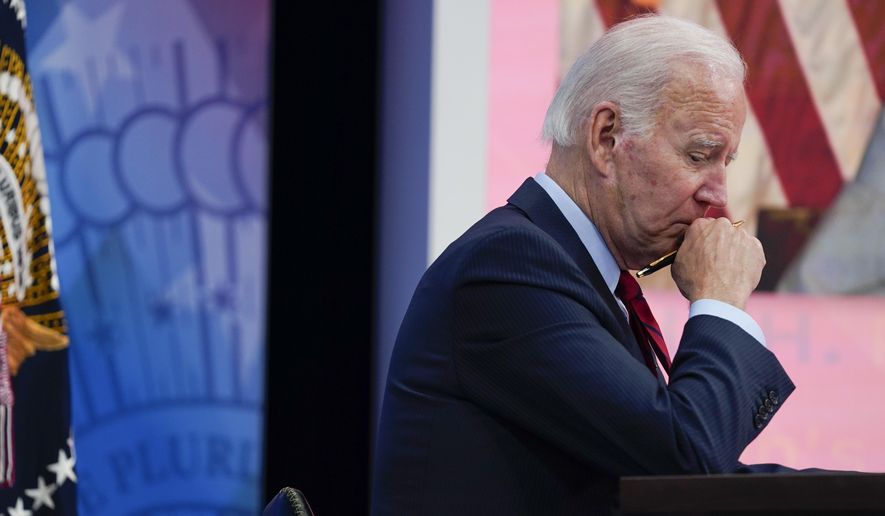What a difference a year makes.
President Biden strutted into the Fourth of July a year ago on solid political footing, declaring the nation’s independence from the coronavirus.
Twelve months later, Mr. Biden is stumbling into the fireworks and festivities bruised — and struggling to convince voters he can right the ship.
Larry Jacobs, a political science professor at the University of Minnesota, said the change over the last year is “night and day.”
“Optimism among Democrats took a hit by the failure to pass the Build Back Better agenda and the subsequent Democratic fighting,” Mr. Jacobs said. “The situation has only gotten worse for Dems — inflation haunts all Americans and will likely go up in the coming months.”
Inflation climbed to a 40-year high last month. The cost of gas and groceries has soared. The stock market and 401(k) retirement accounts have been in a tailspin.
SEE ALSO: Independence Day on track to be a conservative holiday, experts say
The rate of people dying from COVID-19 has slowed, though the death toll surpassed 1 million in the U.S. in May and continues to climb.
Russia’s invasion of Ukraine has made things worse, adding to disruptions in the supply chain brought on by the coronavirus pandemic.
It is creating a hairy political environment for Democrats four months out from the midterm elections where they are defending their fragile House and Senate majorities.
Kevin Sheridan, a GOP strategist, said things started going bad for Mr. Biden after the chaotic pullout of military troops from Afghanistan, which drew condemnation from across the political spectrum and led his approval rating to slip — and stay — below 50%.
“He’s never going to recover from that disgraceful exit,” Mr. Sheridan said.
Since last July, gas prices have jumped from $3.13 a gallon to $4.86 this week, according to AAA. Inflation, meanwhile, has jumped from 5.4% to 8.6% and Republicans have been happy to complain about the baby formula and tampon shortages.
“Every single policy Biden and Democrats have ’accomplished’ has made Americans’ daily lives worse, not better, and that’s why voters are going to fire them into the sun in November,” Mr. Sheridan said.
Democrats hoped things would start to turn around in the fall after Mr. Biden signed the $1 trillion infrastructure bill into law, delivering on a campaign promise.
But the momentum from the bipartisan agreement was not enough to unlock enough support for Mr. Biden’s $1.75 trillion social safety bill — dubbed the Build Back Better plan.
The failure further frustrated liberals, who’ve been lukewarm on Mr. Biden from the beginning.
Democrats say Republicans are the real problem.
“After opposing job-creating infrastructure investments and much-needed pandemic assistance, voting to overturn election results because they didn’t like the outcome, and pushing a nationwide abortion ban, House Republicans have given voters zero reason to trust them with control of Congress,” said Helen Kalla, spokesperson for the Democratic Congressional Campaign Committee.
History shows the president’s party often loses seats in the midterm elections, and the magnitude of the losses is directly tied to the political climate and the seats that are in play.
Out of the 40 midterm elections since the Civil War, the president’s party has lost ground in the House in 37 of them.
In a recent analysis, Kyle Kondik, of the University of Virginia’s Center for Politics, said the presidents and their parties in the three other races benefited “from some sort of extraordinary occurrence.”
President Franklin Roosevelt and Democrats bucked the trend in the 1934 midterms after passing the New Deal during the Great Depression. President Bill Clinton and Democrats made gains in 1998 thanks to a strong economy, and in 2002 President George W. Bush’s popularity soared after the Sept. 11 terrorist attacks.
Democrats are hopeful the Supreme Court’s recent ruling overturning Roe v. Wade could be that sort of seismic event.
Mr. Biden ratcheted up things this week after he called for a filibuster carveout to protect abortion rights, pressuring Senate Democrats to codify Roe into federal law.
Mr. Kondik said the question is whether the abortion issue is enough to overcome the fact that Mr. Biden is unpopular, and voters don’t trust him on the issues they care about most — a list that includes inflation, the economy and crime.
The Real Clear Politics average of polls shows, by a 38% to 57% margin, most voters disapprove of the job Mr. Biden has done as president. It marks a major drop from a year ago when more than 51% approved and 41% disapproved.
“Those numbers are worse than Donald Trump’s at a comparable time in his presidency,” Mr. Kondik said.
The drop in support includes Democrats and spills over into his handling of most issues.
Republicans are predicting victory in November.
“Democrats’ agenda of failure has left Americans worse off in every aspect and that’s why Nancy Pelosi will be fired in four months,” said Michael McAdams, spokesman for the National Republican Congressional Committee.
• Seth McLaughlin can be reached at smclaughlin@washingtontimes.com.




Please read our comment policy before commenting.